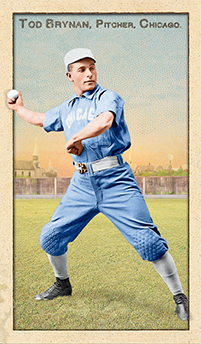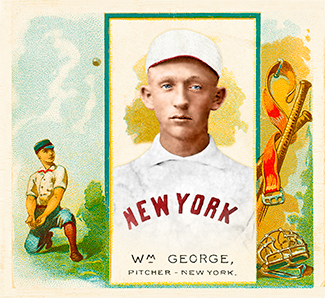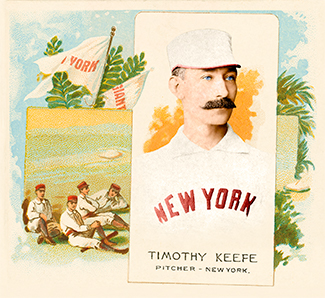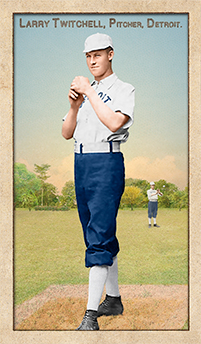
- Series: Beginnings: 1880's
- City: Detroit
- Team: Wolverines
- League: National League
Lawrence Grant Twitchell (1864-1930) spent the afternoon of August 15, 1889 having himself a grand day out. The box score would read: six for six, plus a walk; a homer, three triples, a double and a single; five runs scored; and 16 total bases. Had he not led off three innings he might have had more than his three RBI. Oh, and the outfielder even relieved in the second inning. The Cleveland Leader said of their home team's effort: “Twenty-seven hits for a total of forty-eight bases doesn't grow on every tree and never grew in Cleveland before, that's for sure.” Remarkably, it took a mere five years for Larry's total-bases mark to be eclipsed by Bobby Lowe of the Beaneaters. That mid-summer feat was the highlight, but far from the whole story of Twitchell's career. He was a strong fielder and is purported to have thrown a ball 407' - the longest throw on record in the 19th century. He played for seven MLB clubs over his nine-year career. Prior to returning to his hometown Spiders, Larry had starred for the Wolverines, his first team, from 1886-88 including the '87 “world series” title versus the Browns. That championship season saw Twitchell hit .333 while taking the “mound” in 15 games (twelve as a starter) and going 11-1. Ironically, Twitchell's teammate in Detroit, the renowned slugger Dan Brouthers, had set the NL record for total bases in 1886 with 15. After leaving the Spiders for Cleveland's Players' League entry in 1890, Larry migrated to other teams and lesser performance. It must have been satisfying when he was invited to a Cleveland Old Timer's game in 1921, playing alongside fellow sandlot veterans Cy Young, Chief Zimmer, Nap Lajoie and Elmer Flick.
- Twitchell's only blemish as a pitcher in '87 came in a 14-inning one-hitter loss
- His five extra-base hit day wasn't equalled until Josh Hamilton did it in 2012. In 2015, Jackie Bradley, Jr. also tied that mark
- Inducted into Cleveland Sports Hall of Fame: 1980
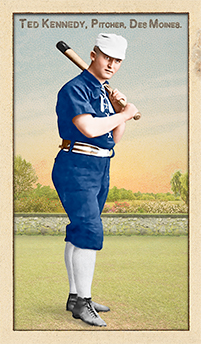
- Series: Beginnings: 1880's
- City: Des Moines
- Team: Prohibitionists
- League: Western Association
Theodore A. Kennedy (1865-1907) was an ill-starred young pitcher who learned from the best, executed effectively and, as so many of his era, flamed out early with a ruined shoulder. In our day, with Tommy John surgery nearly a rite of passage for aspiring big-leaguers, it is sobering to consider the plight of the young men of the 19th century who were thrown into unrelenting action and treated as disposable cogs in professional baseball's juggernaut. Such was the lot of Ted Kennedy. As a youth, he was ball boy in Peoria studying the not-yet-Old-Hoss Charlie Radbourn, the star pitcher for the town's very fine amateur squad. Radbourn was said to have been the first to master the overhand curve delivery that would carry him to greatness with Providence years later. Radbourn showed Ted the grip and Ted worked hard to learn it. He emerged in mid-west circles as one of the most promising young pitchers in 1884, a year of turmoil in the major leagues that left minor league teams scrambling for talent. The next season Kennedy got his break when Cap Anson brought him to Chicago. The Chicago Tribune's June 12 edition reported: “The Chicago team will place a new man in the pitcher's box today—Ned Kennedy, until recently with the Keokuk nine, and looked upon as one of the strongest unengaged pitchers in the country.” Ted's astounding strikeout record had made that reputation. Before the call-up, his highlight was 24 Ks, including 17 straight, in a game with no putouts by the first baseman against Burlington in October of '84. Sadly, Ted's arm didn't survive his rookie year. After hurling three games in two days, his shoulder gave out. Though he pitched one more year in the majors and a few in the minors, he was never the same. Kennedy later remembered, "I was terribly lame - had to pitch underhand. Every game I pitched that season it was like a rusty knife was being thrust into my shoulder."
- In retirement, Kennedy found a lucrative career in sporting goods, eventually selling out to the Spalding empire but continuing to teach youngsters how to throw the curve
- Ars Longa is indebted to the research of SABR's Craig Lammers for much of this bio
- Kennedy's uniform color on this card was changed in July, 2017 from black to blue to reflect recent reliable research by Craig Brown & friends at Threads of Our Game. One card was previously released featuring a black uniform.
- Series: Beginnings: 1880's
- City: Chicago
- Team: White Stockings
- League: National League
Charles Ruley Brynan (1863-1925) had two cups of coffee with major league clubs separated by three years. He was primarily a minor-league, right-handed pitcher with quick looks by two National League teams: the Chicago White Stockings in 1888 and the Boston Beaneaters in 1891. Along the way “Tod” played with two Southern Association teams in ‘86, the Nashville Americans and Memphis Grays followed the next year with the Duluth Freezers. In ‘88 Brynan played for the Minneapolis Millers and St Paul Apostles before getting a late-season chance with Chicago where he was 2-1 with a high 6.48 ERA. He fared worse with Boston, failing to get out of the first inning after giving up six.
- The remainder of his service had been with the Milwaukee Brewers, Des Moines Prohibitionists and Grand Rapids of the Michigan State League in 1889
- Brynan’s career mark in the minors was 31-39 with a 3.00 ERA
- Series: 1888 Champion New York Giants
- City: New York
- Team: Giants
- League: National League
William M. George (1865-1916) was a left-handed pitcher & outfielder for two major league teams over 3 years in the late 1880s. He debuted as a pitcher for the NY Giants in ’87. During his two seasons on the mound, George went 5-10 with a 4.51 ERA. His mediocre performance led to him being released by the Giants in June of ‘89. He had not gotten into a game that year in NY. The native of Bellaire, OH tried out with the American Association’s Columbus Solons in July of 1889. They picked him up as an outfielder. Bill got into five games that summer, getting 4 hits and 3 RBI in 17 at-bats & was released in August, ending his major league experience.
- Bill’s record in ’88 was 2-1 with a 1.34 ERA. But, with Tim Keefe winning 35 with an 1.74 ERA & Mickey Welch winning 26 with a 1.93 ERA, the competition was stiff on the pennant winner
- Series: 1888 Champion New York Giants
- City: New York
- Team: Giants
- League: National League
- Hall: National Baseball Hall of Fame
Smiling Tim, Sir Timothy (1857-1933). A dominant pitcher for 5 teams over 14 seasons, Keefe’s 1st season was the last in which pitchers threw from 45′ & his last season was the 1st in which they threw from 60’6″. In an extraordinary career, Keefe won 20+ gms 7x; 30+ gms 6x; 40+ gms 2x; 200+ Ks 6x; 300+ Ks 2x; & posted lowest ERA in history: 0.86 in 1880.
- Won Triple Crown: 1888
- ERA Champ: ’80, ’85, ’88
- 342 career Wins
- Elected to Hall of Fame: 1964


